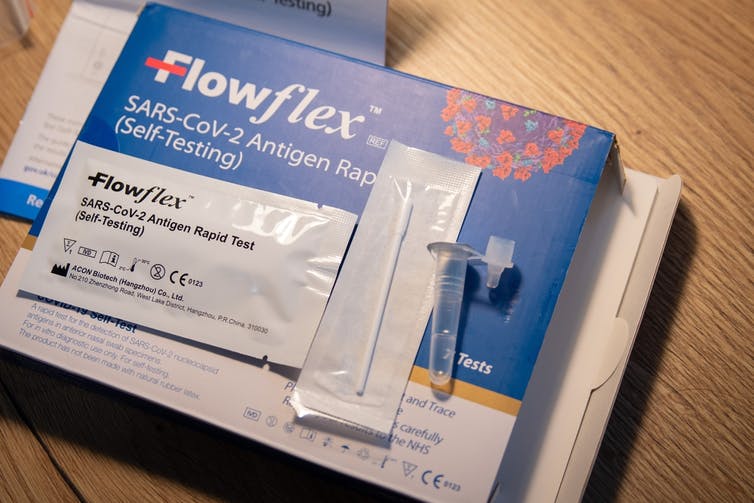
eldar nurkovic/Shutterstock
The legal requirement to self-isolate when infected with the coronavirus will end in England on February 24, the UK prime minister has announced. It’s been two long years since the start of the pandemic, and during that time, our everyday behaviours have been subject to a number of rules and regulations. Removing self-isolation is one of the final steps in reversing these rules and moving towards “living with COVID”.
Like many, I feel it’s too early for this move. It is also a bad idea to stop providing free lateral flow tests, which from April 1 people will need to pay for. But perhaps more important is what the public thinks. How might people behave once free testing and mandatory self-isolation are scrapped?
Just as it’s hard to predict what the virus will do in the future, so too is it hard to predict people’s behaviour. Very few of us in Britain have emerged from a pandemic before. That said, we can look to the past – and to behavioural science – to make an informed guess about what people will do.
Read more:
COVID: lifting the remaining measures is a dangerous and senseless move – expert view
We know that adherence to COVID measures in the UK has been, on balance, very high throughout the pandemic. That said, research has suggested that some form of “pandemic fatigue” did eventually set in, causing adherence to measures to fall, particularly for “high-cost” behaviours such as lockdowns or restrictions on visiting others.
Self-isolation of course is another high-cost behaviour. It requires considerable sacrifices. As both my colleagues and I and others have shown, there are a number of financial, practical and mental health challenges encountered by those self-isolating. The problem is that it’s also a high-benefit behaviour. Isolating when infectious is one of the most effective ways to reduce the transmission of COVID.
We certainly shouldn’t assume things will completely return to a pre-pandemic normal, where people generally didn’t isolate to prevent spreading illnesses, and tended to stay home only if they felt too unwell to go to work. The pandemic has changed our behaviour.
After two years, many of us are still avoiding things that we used to do frequently, such as socialising, hugging or shaking hands. Moreover, according to a recent poll nearly three-quarters of people support keeping the legal requirement to self-isolate – suggesting that many feel it is still important.
But it’s also reasonable to expect that removing rules will likely lead to a decrease in the behaviours they relate to. We have seen this with mask wearing. Data shows how mask wearing dropped off in England in summer 2021 following the removal of the requirement to wear face coverings in some indoor settings. This is despite mask wearing being a relatively low-cost, habitual behaviour.

Pranav Kukreja/Shutterstock
With testing, getting rid of free lateral flow tests – and so reducing people’s ability to test easily – will almost certainly lead to a reduction in this behaviour. Having to pay for free tests places a disproportionate burden on those on the lowest incomes, so the reduction in testing may be greatest in this group.
The ending of self-isolation rules and free testing provision may also signal to people that testing isn’t important, and so dampen motivations to keep doing it. Earlier in the pandemic, uptake of lateral flow testing was low, but was higher this past winter as free testing was accompanied by a clear message over its usefulness.
How to maintain good behaviours
If we want people to carry on testing and self-isolating if they have COVID, even though they’re no strictly longer required to, we need to make sure that we minimise the costs and maximimise the benefits for people.
Getting people to maintain behaviours requires the same things as getting people to change them in the first place: people need a motivation to keep doing what they’re doing – a clear, positive message around how voluntary self-isolation still helps – as well as the capability and opportunity to do so. That is, sufficient economic, social, practical and emotional support.

Mabeline72/Shutterstock
This means ensuring that people can afford to self-isolate. The best way to do this is to make sure that statutory sick pay is sufficient and is available from day one of someone’s isolation. Beyond that, we also need to continue the cultural change away from presenteeism – employers and organisations need to encourage and enable workers to work from home, or stay at home (depending on circumstance and job type) when unwell. As well as sufficient government financial support for employers and employees, continuing hybrid working arrangements will help.
After two long years, we have a lot to be optimistic about. Some mobile phone data that reveals trends in people’s movements suggests we are already back to pre-pandemic levels of activity. But we don’t want to throw the baby out with the bathwater. Voluntary self-isolation can be a way of protecting others as we continue, cautiously, to put the past two years behind us. It’s likely some will still choose to self-isolate if they think they might have the virus – but more needs to be done to convince others that doing so is worthwhile.
![]()
Simon Nicholas Williams has received funding from Public Health Wales and Senedd Cymru (the Welsh parliament) for separate projects related to COVID but unrelated to the current article. This article reflects the views of the author only and not any institutions or funding bodies.























